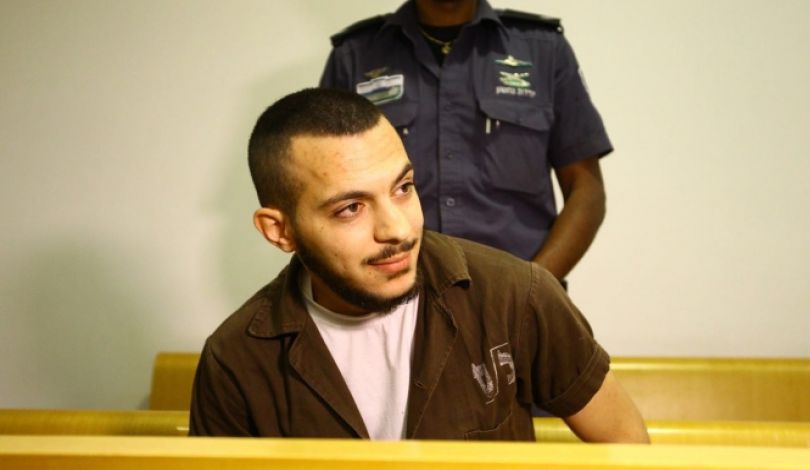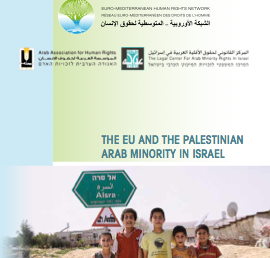Israel is trying to revoke Alaa Zayoud’s citizenship. Why is this important?
The Haifa District Court held a hearing on Sunday, 28 May, 2017 to discuss arguments filed by Adalah – The Legal Center for Arab Minority Rights in Israel and the Association for Civil Rights in Israel (ACRI) demanding that the court to reject Interior Minister Aryeh Deri's request to revoke the citizenship of Mr. Alaa Zayoud.

Zayoud is a Palestinian citizen of Israel from the town of Umm al-Fahem who was sentenced to 25 years in prison on charges related to an attempted murder.
Why is this important?
- The law is being applied in a selective and discriminatory manner solely against Palestinian citizens of Israel: Israel's Citizenship Law, as amended in 2008, allows the court to approve requests from the interior minister to revoke the citizenship of Israeli citizens for "breach of loyalty". This law is being applied in a selective and discriminatory manner against Arab Palestinian citizens of Israel. In their supplemental motion filed in December 2016, Adalah and ACRI demanded the cancellation of this amendment, alternatively demanded that the court rejects its application in this case.
- The law is being applied only to Palestinians citizens – not to Jewish citizens: Adalah Attorney Sawsan Zaher and ACRI Attorney Oded Feller referenced a number of serious incidents in which Israeli Jewish citizens attacked Arab citizens and Palestinians following the enactment of the new amendment that did not result in any requests for revocation of citizenship status. Examples: The three Israeli Jewish citizens convicted in the murder of Muhammad Abu Khdeir (a 16-year-old Palestinian boy from Shuafat, in East Jerusalem, who was beaten and burned to death); and the Israeli arson attack that killed three members of the Dawabsheh family in the West Bank village of Duma. In those cases, the state did not even explain why it had not applied the amendment.
- The law is unconstitutional: Adalah and ACRI maintain that the amendment, which permits the interior minister to make a request to revoke an Israeli’s citizenship, allows for the sweeping and arbitrary application, in accordance with political considerations and is itself unconstitutional. This is an extreme act as it involves the revocation of the most important constitutional right of all rights – the right to citizenship.
- Israel does not know if revocation of citizenship even deters such violent acts: During the court hearing, Adalah and ACRI argued that while the state claims it must revoke Zayoud’s citizenship as deterrence against similar future acts, it actually has no indication that revocation of citizenship would indeed serve this purpose. Israel intends to study its potential future effect only after having revoked Zayoud’s citizenship. Adalah and ACRI maintain that this measure amounts to the state's experimentation on Israeli citizens via the overt violation of their constitutional rights.
- Violation of multiple constitutional rights: The revocation of citizenship has grave consequences given that this right is the basis for other constitutional rights, including the right to political participation and socio-economic rights.
- Prohibited by international law: International law opposes the revocation of citizenship, as established in the Universal Declaration of Human Rights, the Convention Relating to the Status of Stateless Persons, and the Convention on the Reduction of Statelessness, which Israel signed in 1961.
WHAT HAPPENED IN LAST WEEK’S RECENT HEARING?
Adalah and ACRI maintained that the state changed it reasons for revoking Zayoud’s citizenship during the course of the legal process, thus requiring the court's dismissal of the state’s motion and the rejection of Interior Minister Deri’s request. Since the state's motion was originally submitted, a new procedure has been formulated for revocation of citizenship and the term “act of terror” has been redefined in the law. A new decision has been made according to which, following the revocation of Zayoud’s citizenship, he will receive temporary resident status. In January 2017, the Shin Bet internal security service filed a new report detailing the need to deter Arab citizens who have parents who are residents of the Palestinian Authority.
In light of the multiple changes of the state's position, Haifa District Court Judge Avraham Elyakim questioned in the hearing whether it was indeed appropriate that Interior Minister Deri reconsider his request to revoke Zayoud’s citizenship.
Judge Elyakim stated that he will issue a ruling on the case at a later date.
Adalah will keep journalists updated on the status of this case.
CLICK HERE to read the transcript of the hearing
Case Citation: Administrative Petition 57857-05-16, Interior Minister v. Alaa Zayoud (Haifa District Court) (case pending)















